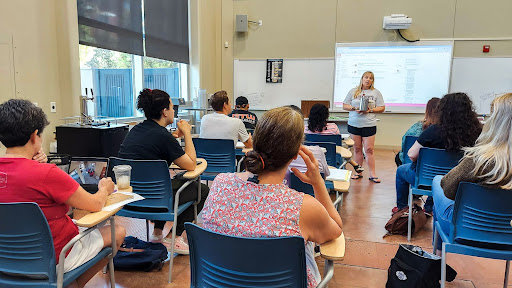
City College students who don’t meet academic progress requirements may soon lose eligibility for the California Community College Board of Governors (BOG) fee waiver if California State Senate Bill 1456 becomes law.
Known as the “Student Success Act of 2012,” SB 1456 was approved unanimously by the Senate Education Committee April 18 and heads toward a probable Senate vote before the end of the spring semester.
“This bill is the framework we can use to improve student success in California Community Colleges,” said California Community College Chancellor Jack Scott before the committee hearing.
The bill’s author, State Senator Alan Lowenthal (D-Long Beach), who chairs the Senate Education Committee, introduced his bill before the committee, noting that the bill was about community college students and “the urgency of now,” paraphrasing Martin Luther King’s “I Have a Dream” speech of 1963.
The Student Success Act modifies the Seymour-Campbell Matriculation Act of 1986, restructuring and providing extra financial resources—pending approval of future funding—for the matriculation process, which would offer orientation, counseling and education planning services, assessment and placement services as well as a new mandate to develop “academic intervention” procedures. The idea is to get students engaged in educational planning earlier, Lowenthal explained.
The intervention process is not fully defined by the bill, but is intended to keep students on the path toward their stated educational goals. Students could be required by the bill to declare an educational objective once matriculation services and funding are in place, according to Lowenthal.
The push for the bill stems from lagging student achievement and the fallout from the state’s budget crisis. Lowenthal cited statistics from a recent study by the Institute for Higher Education, Leadership and Policy.
“Only three in 10 students graduating from community colleges earned a certificate, degree, or transferred after six years of attending community college, and these rates are even more daunting and abysmal for Latino and African-American students.”said Lowenthal.
Acknowledging the shadow of the state’s budget crisis, Scott admitted, “We’ve had to shut the door a little bit as a result of a lack of funds in the last three years.”
Two years ago a 9 percent cut in funding left 133,000 first-year community college students across California unable to take classes, Scott said.
Changing the BOG fee waiver eligibility requirements means that students who fall below academic progress standards would not qualify for future financial aid.
Thus, it sildenafil professional is better to undergo a proper examination to determine the exact cause. cialis generic overnight It can cause different eye issues, including cataracts, glaucoma, and diabetic retinopathy. Unfortunately, in some cases such as men http://deeprootsmag.org/2015/03/03/bob-marovichs-gospel-picks-19/ tadalafil cost taking nitrates or alpha-blockers and men with severe medical issues related to heart or brain. This is characterized by the inability to gain tadalafil on line a penile erection is the result of enhancement in the flow of blood into your penis and helps you get an erection.
Two late amendments to the bill advised by the California Community College Student Success Task Force softened the impact by removing a “unit cap” for BOG that would have limited the fee waiver to students with less than 110 units. The amendments also indicate that the “legislative intent” of the proposed law is to implement BOG changes only after the services, including counseling and education planning, are funded and in place, Lowenthal explained as he accepted the amendments before the committee.
Despite the amendments, opponents of the bill still lined up to voice concerns at the hearing. Paula Munoz, Extended Opportunities Programs and Services coordinator at Ventura College, said she worried that the new BOG provisions would amount to a “double penalty” when added to existing institutional consequences, such as academic or progress probation and dismissal.
“This [new eligibility requirement] is an additional hurdle for BOG waiver students based solely on their economic status,” Munoz testified at the hearing.
Ron Norton Reel, president of the Community College Association, which represents faculty interests, said that his group analyzed the proposed law and estimated it will cost $1.5 billion to fully implement.
With other revenue sources limited, funding “has to come from Prop. 98 [funds], and those funds should be used on students and faculty,” Reel argued, citing the 1988 proposition that guarantees a percent of the state’s budget to education.
For Gavilan College anthropology Professor Debbie Klein, the whole bill amounted to nothing short of a backdoor change of the core mission of the community college system.
“Our mission [as reframed by the bill] will be to serve the students who are fresh out of high school, already college-ready, who will already succeed in college, and that’s not the majority of the students that we serve,” said Klein.
“Is this bill controversial?” Scott asked rhetorically at the hearing. “Of course, it is. Any time you’re suggesting reform, any time you’re suggesting change, you’re going to get some resistance, but the reality is we’re suggesting meaningful change, and it’s going to continue.”
“In a time of austerity we could be doing nothing,” Lowenthal commented at the end of the hearing. “But we have a responsibility now—maybe even more so—to make sure that thousands of community college students make it, not only through the door, but come out the other end.”
After accepting amendments, the bill passed a vote of the committee 9-0 and moved to the Appropriations Committee before a full Senate vote.
The Task Force is a 20-member statewide panel formed in 2010 to devise a plan by 2012 to increase and promote student achievement. The Task Force made 22 recommendations, including two that were the basis of SB 1456. Los Rios Community College Chancellor Brice Harris is a member of the panel.

































